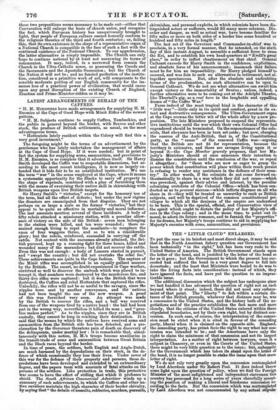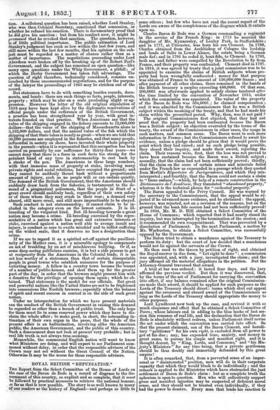THE " LITTLE CLOUD " ENLARGED.
To put the case in its briefest and most direct shape, it may be said that in the North American fishery question our Government has been technically " in the right," but has been very rude to the United States of America. The British Government stands upon the letter of the bond, and is justified by the letter of the bond so far as it goes ; but the Government to which the present has suc- ceeded had suffered the bond in a very great degree to fall into desuetude ; and the least that Ministers were bound to do was to take the living facts into consideration : instead of which, they have ignored the facts, and have put the question to an imprac- ticable issue.
The additional discussion which the subject has undergone since we last handled it has advanced the question of right not an inch beyond where it stood; indeed, there did not need any enforce- ment of that point. The " liberty " to fish within a certain dis- tance of the British grounds, whatever that distance may be, was a concession to the United States, and the history both of the ne- gotiations and of the practice establishes the fact more and more clearly, that the citizens of the United States entered within these stipulated boundaries, not by their own right, but by distinct con- cession. In such case, of coarse, the interpretation of the conces- sion must be strict when it is cited in favour of the conceding party, liberal when it is claimed on the opposite side. England, the conceding party, has prima facie the right to say what her con- cession was intended to be ; and the Americans have only the right to claim the minimum of that concession and not its largest interpretation. As a matter of right between lawyers, were it a subject in Chancery, or even in the Courts of the United States, there might be very little question as to the issue; but, unhappily for the Government which has taken its stand upon the letter of the bond, it is no longer possible to stake the issue upon that mere letter of right. We do not rely very greatly upon the concession contemplated by Lord Aberdeen under Sir Robert Peel. It does indeed throw some light upon the question of policy, when we find the Foreign Minister of the most enlightened and independent statesman this country has possessed for a long series of years cheerfully accept- ing the position of making a liberal and handsome concession ac- cording to the facts. But the concession which was contemplated by Lord Aberdeen was not consummated by any actual st4puls-
tion. A collateral question has been raised, whether Lord Stanley, who was then Colonial Secretary, sanctioned that concession, or whether he refused his sanction. There is documentary proof that he did give his sanction : but from his conduct now, it might be resumed that he revoked that sanction. The question, however, is of little political importance. The public estimation of Lord Stanley's judgment has sunk so low within the last few years, and still more witUn the last few months, that his opinion on the sub- ject must be regarded as a matter of chance rather than as a matter of importance. The negotiations proceeding under Lord Aberdeen were broken off by the breaking up of Sir Robert Peel's Government, and the subject has remained an open question—like many open questions under the Whig Government, a pitfall; of which the Derby Government has taken full advantage. The question of right therefore, technically considered, remains un- touched by those unconsummated negotiations, and for the purpose of the lawyer the proceedings of 1845 may be stricken out of the record.
But statesmen have to do with something besides records, docu- ments, and bonds : there are such things as facts, people, interests, property • which may be also on a scale precluding slight or ag- gression. However the letter of the old original stipulation of 1818 may have been kept alive by the diplomatic reservations of official people under the sufferance of the British Government, a practice has been strengthened year by year, with great in- terests founded on that practice. When Americans say that the value of the shipping engaged in the fishery amounts to 12,000,000 dollars—that the value of the shipping of Massachusetts alone is 3,532,000 dollars, and that the annual value of the fish which the shipping of that State takes is nearly as great—when we are told that 30,000 persons are employed in the fisheries, and that many people, influential in society on shore, have invested their whole property in the pursuit—when it is represented that this occupation has been carried on peaceably by our sufferance for thirty-four years—we cannot deny that there is a force in such facts too strong for the petulant hand of any tyro in statesmanship to cast back by a stroke of the pen. The Americans in these large numbers, with that immense mass of property at stake, involving many private rights and social relations, have occupied the ground ; and they cannot be suddenly thrust back without a proportionate amount of injury, such as no people will or can endure quietly. The demand of the British Government, that the Americans should suddenly draw back from the fisheries, is tantamount to the de- mand of a pragmatical policeman, that the people in front of a great crowd should suddenly back, regardless of their own safety or of those whom they may crush in their rear ; a demand very absurd, still more cruel, and still more impracticable to be obeyed.
Such conduct is not statesmanship ; it cannot claim to be in- cluded in the category even on the lowest estimate. It is ill- breeding of the vulgarest kind. But ill-breeding towards a great nation may become a crime. Ill-breeding exercised by the repre- sentative of a nation which has great and extensive interests at stake, exercised against a nation well able to avenge insult and injury, is conduct so sure to excite mischief and to inflict suffering on the widest scale, that it deserves no less a designation than crime.
If we are to regard it as a spirited set-off against the pusillani- mity of the Mather case, it is a miserable apology to compensate an act of truckling by an act of mischievous bullying. Or if, as some deep-seeing politicians surmise, it is but a side process to get at reciprocity from the Americans in the Colonial trade, it is an act less worthy of a statesman than that of certain disreputable people in great towns who establish nuisances for the purpose of extorting money. A fellow in a country town became the tenant of a number of public-houses, and shut them up for the greater part of the day, in order that the brewers might present him with a donative for the privilege of opening them again ; which he ob- tained. That statesman is the model for our officials. But great and powerful nations like the United States are not to be frightened into concessions like Norfolk brewers ; especially when the balance of spirit and recent success in contest is on the side of such great nation.
Under no interpretation for which we have present materials can the conduct of the British Government in raising this demand be regarded as other than a breach of public trust. The only hope for them must he in some reserved power which they have to dis- claim the whole affair ; to make good, in short, the astounding in- timation of their own organ in the press, that the whole of the present affair is an hallucination, involving alike the American public, the American Government, and the public of this country. Such a denouement does not look at present very probable ; but in real life truth is not always true-seeming. Meanwhile, the commercial English nation will want to know what Ministers are doing, and will expect to see Parliament sum- moned without delay, in order that the responsible advisers of the Crown may not act without the Great Council of the Nation. Otherwise it may be the worse for those responsible advisers.



























 Previous page
Previous page